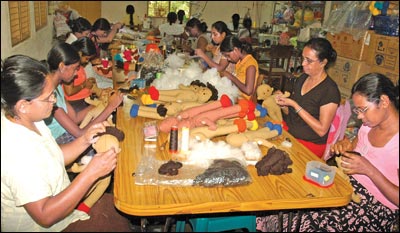|
 Mali Toys captures international market: Mali Toys captures international market:
Hard work bears fruit for toy maker
Sanjeevi Jayasuriya
Hard work and untiring efforts pay rich dividends. Mali Toys has
captured the market with its quality products and won numerous customers
locally and internationally. The co-partner of the enterprise Anoja
Sudharshani ventured in to the soft toys business and today operates a
successful enterprise showcasing her inborn talents in this soft skilled
industry.
She was interviewed by Daily News Business.
Q: What is the type of your business and how do you set about
it?
|

Mali Toys workshop. Pictures by Saliya Rupasinghe |
A: Mali Toys is a partnership that my husband and I operate.
We started making handloom fabric soft toys over two decades ago. We
have been in the export market since 1992. We export our products to the
UK, the Netherlands and Japan.
We are extremely grateful to Ruzil Hussain of Linen Cupboard Liberty
Plaza for providing us with a ready market at the beginning and also the
Export Development Board (EDB) for encouraging and helping us to hold
two exhibitions in Germany and Japan. The EDB paid for the air fare and
stall costs. We are happy that we have given back to Sri Lanka one
hundred times more than what they had incurred in foreign exchange.
Mali Toys are made from 100 percent cotton, Sri Lankan hand-woven
fabrics. I am the designer and quality controller. My husband does all
the other work. We have employed 20 girls and also distribute the work
in the neighbouring areas.
The work related to the finished product includes laying out the
fabric, cutting, sewing, filling and finishing the toy. The machine work
is a minor part of the process and the hand work involves most of the
cost. I have produced a wide range of toys - from the traditional Sri
Lankan dolls, aborigines and cola bears of Australia to reindeer and
even Eskimos of Alaska.
The elephant is a very popular item in all countries we export to and
there are different colour requirements inherent to each country.
Quality is a must and we are in the market due to our stringent
standards. We have a repeat clientele as our products are turned out of
hand-woven fabric. Some of our clients send us the designs which are
produced accordingly.
Our speciality is the use of hand-woven fabrics and they are made
from hand dyed yarn and most of the time the colours vary from the
original. This enables me to match the fabric for each toy. This gives
it thousands of different patterns and is the uniqueness of the hand
made toy. A medium fabric is ideal to make the shapes. The expensive
thick curtain fabric and the fabric of the Government Weaving Sales
Centre which is too thin are not suitable.
|

Anoja Sudharshani |
The success of the business is the creativity and not copying from
others. The customer needs a unique and genuine item of design. The
business is now picking up and there is a growing demand for the
products.
Q: How do you balance family life and business?
A: My husband is involved in the business and he supports me a
great deal. I have two children and they are grown up. We manage things
on our own. We run the business smoothly and spend quality time
together. I strike a balance between the business and family as I manage
time efficiently.
Q: What are the challenges you faced?
A: Finding handloom fabrics is becoming increasingly difficult
day by day. The Government withdraw the incentive given to the handloom
fabric product export in 2007.
Thereafter many handloom fabric manufacturers switched to power loom
fabric making. You could hear the thundering sounds of machines in those
weaving centres instead of the familiar “takas tukus” noise of the
handloom machine. They use the same yarn and weave it a little loose.
However, the price is high. The withdrawal of the incentive is a big
blow to the industry. It is important to have an incentive scheme to
help the real craftsmen at grass-roots level for the industry to
benefit.
The business also faces difficulty in the trade. With our limited
resources we are unable to tap expensive markets.
We also have to pay VAT for indirect exports. I get VAT bills only
for the polyester fibre filling as the handloom fabric is not under VAT.
But when I sell the products I have to pay VAT. This means I have to pay
VAT over the fabric cost, labour and profits. It is too much to absorb.
The electricity and water rates come under business tariff and this adds
to higher production costs.
I also face difficulties in export documentation. The Customs
Department needs to be more business friendly. It is important to have a
convenient air parcel or courier service for the benefit of
industrialists. At times we have to undergo an expensive documentation
process for even small quantities.
Q: What is your advice to women in business?
A: Do whatever that matches your talent. Find markets for your
products and develop a strong customer base. Product quality is a must
and it should cater to the market demand.
Q: What are your goals?
A: We need to come up in business. Though we are at a
satisfactory level we need to develop the business further. Some of my
contemporaries who took to the business with us are no longer in
business. I still feel that this field has much scope. This would
generate employment opportunities for girls in urban areas and village
weavers.
Q: As a woman was it an advantage to be in business?
A: Yes. This enterprise provides more freedom and livelihood
for many women. However, encouragement and motivation are lacking for
many to continue in this field.
Q: What are your achievements in business and family?
A: We have taken this business to a higher level. We have a
factory where 20 girls are employed and others in nearby areas also
benefit by it. I have supported many families to improve their living
standards.
My children are well educated and doing well in life. I have a
supportive husband and I am content with what I have achieved in life.
Q: What is your contribution to the society?
A: The economic contribution and providing jobs for many
people for a better living is my main contribution. I have also
conducted workshops to impart my knowledge. However, it is necessary to
find markets for these products for greater sustainability.
Turning out toys is a medicine for the soul and it gives immense
satisfaction to see an item taking shape with your skill. It is also a
respectable livelihood and I wish to see this trade prosper with time
touching many lives with a bright future.
|



